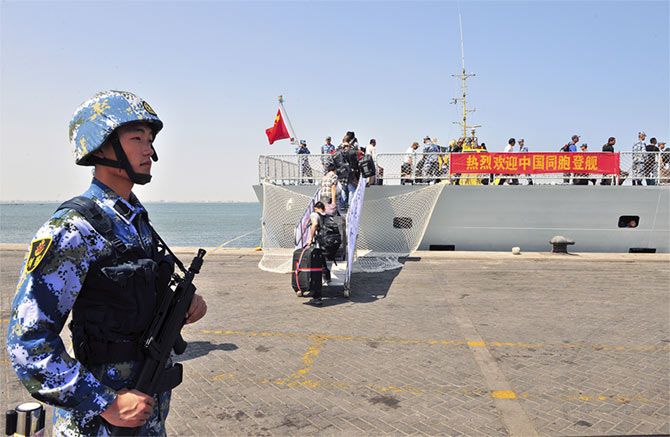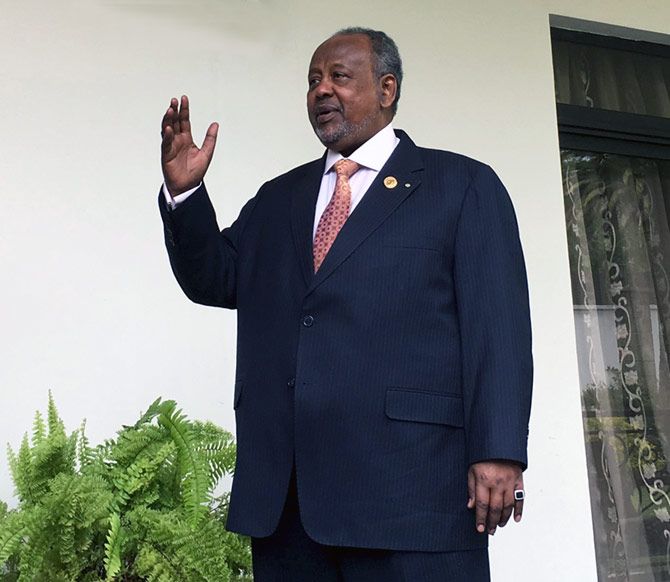'China's moves are of direct significance to India, which will closely monitor Chinese naval activity in the Bay of Bengal and the Indian Ocean not least because of Chinese maps depicting claims over the Andaman and Nicobar Islands,' says former senior RA&W official Jayadev Ranade.

On January 21, 2016, China took a big stride towards fulfilling its almost decade-long quest of getting port facilities for the People's Liberation Army Navy -- PLAN -- in the Indian Ocean.
In a little publicised comment, US African Command, AFRICOM, Commander General David Rodriguez said, 'They are going to build a base in Djibouti, so that will be their first military location in Africa.'
Djibouti's President Ismail Omar Guelleh signed agreements with China on January 20, 2016, to set up a trade zone and establish a legal framework to let Chinese banks operate in the African nation. The first phase of the 48 sq km free zone for trade and business is to be completed by 2016. There are plans to expand Djibouti's role as a transhipment port for Chinese goods and cargo.
China has had an interest in Djibouti as an Indian Ocean port since at least 2013, with credible reports surfacing at regular intervals of contacts between the authorities in China and Djibouti.
PLAN ships and officers have familiarised themselves with Djibouti, which they have visited more than 50 times since the PLAN began conducting anti-piracy operations off Aden from December 2008. The visits have mainly been for in-port rest and replenishment.
China's official news agency Xinhua, on February 27, 2014, quoted Djibouti's Defence Minister Hassan Darar Houffaneh as calling for more military cooperation between his country and China to contribute to peace and security in the sub-region.
Djibouti, Houffaneh said, was ready to allow Chinese military ships to access its ports and urged his Chinese counterpart to concretise the military cooperation between the two countries.
Chinese Defence Minister Chang Wanquan, who was then on a visit to Djibouti, assured him that 'The People's Republic of China is ready to support Djibouti to reinforce its military capacities and guarantee its security.
The PLAN has long been interested in a permanent presence in the Indian Ocean. Since China began anti-piracy operations off Aden, the PLAN has ensured that by now captains of all its warships have done a tour of duty in the Indian Ocean.
Beijing's plans to develop Djibouti as a 'navy base' in the Indian Ocean meshes with the PLA's stated task of being capable of defending China's national interests at home and abroad while expanding China's strategic space.
The emphasis on 'integrated joint operations' and ongoing military reforms are to enable the PLA achieve these objectives.
Relevant in this context is that Djibouti is within the un-refuelled flight range of an IL-76, or Shaanxi Y-8 maritime patrol aircraft, taking off from airbases in southern Xinjiang.
It would give China an airfield that would simultaneously significantly improve its intelligence gathering capabilities over the Arabian Peninsula, Egypt, Eastern Libya and well into Central Africa.

The existing port at Djibouti can accommodate the largest vessels presently in PLAN's inventory. Experts assess that China will choose to develop Obock, in the northeast corner of Djibouti, as its base as that would provide relative secrecy for operations and surveillance.
Beijing has, anticipatedly, developed economic linkages with Djibouti as well. The China Merchants Group funded construction of the Damerjog livestock port and the multipurpose Doraleh port, both of which were launched in 2013.
Later, the China Communications Construction Company Tianjin constructed a salt pier in Djibouti. More recently, in August 2014, the China State Construction and Engineering Company won the bid for the engineering, procurement, and construction project of Phase I of the Doraleh Wharf in Djibouti, which includes construction of a 1,200 m long frontage for five multi-purpose deep water berths, a 175 m long service berth, and related supporting facilities.
China Merchants Holdings (International) holds a 23.5% stake in Port de Djibouti S A, which includes two-thirds of the port's Doraleh Container Terminal.
As China concretises its effort to secure a foothold in the Indian Ocean, it continues to look for other bases in the Indian Ocean littoral.
The Namibian Times on November 24, 2014 disclosed that China and Namibia are holding high-level talks regarding construction of a naval maintenance and supply base for the PLA Navy at Walvis Bay. It added that a satellite tracking station nearby at Swakopmund, makes Walvis Bay suitable for future PLA naval operations in the region.
China announced its ambition to become a maritime power at the 18th Party Congress in November 2012.
As it commenced building its second aircraft carrier, a US military think-tank in May 2015 separately assessed that China will have about 415 warships including four aircraft carriers and 100 submarines in the near future, which will enable it to alter the politics and strategies throughout the Asian theatre.
China's moves are of direct significance to India, which will closely monitor Chinese naval activity in the Bay of Bengal and the Indian Ocean not least because of Chinese maps depicting claims over the Andaman and Nicobar Islands.
Jaydev Ranade -- a former Additional Secretary in the Cabinet Secretariat, Government of India -- is President of the Centre for China Analysis and Strategy.











